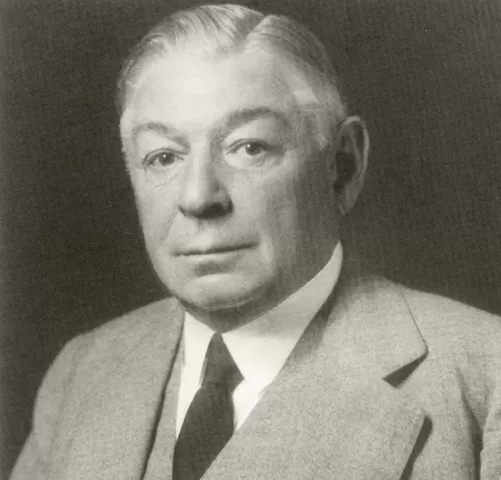Arthur Vining Davis (1867-1962) was born a minister’s son in Massachusetts, where he graduated Phi Beta Kappa from Amherst College in 1888. His minister-father found him a job with the Pittsburgh Reduction Company, whose owner had developed a process to produce aluminum inexpensively. By 1907, Davis was director of the company and converted it to the Aluminum Company of America (Alcoa), which he ran until 1958. At the end of World War II, Alcoa was producing 90 percent of all virgin aluminum in the United States.
Davis was 82 when he purchased fifty acres on Biscayne Bay in 1949 for retirement. He told his secretary, however, “I wouldn’t live six weeks if I quit.” Instead he invested in land and either bought or started various businesses. He amassed about 100,000 acres in South Florida, and more in the Bahamas and on a Cuban island.
Davis purchased the Boca Raton Hotel & Club in 1956 for $22.5 million. Addison Mizner had built it with others in 1926. Davis spent another $1 million to improve the hotel and brought in golfer Sam Snead and tennis pro Fred Perry. His purchase of another 1,500 acres in the surrounding rural community started a real estate boom. Davis introduced polo to Boca Raton in 1955, adding fields south of the hotel.
All of Davis’ property was transferred to a new public corporation, Arvida, in 1958, but Davis retained sixty percent of the stock. The stock sales provided the capital to develop the $5 million Royal Palm Yacht and Country Club. The subdivision, which was the first planned unit development (PUD), replaced the polo fields, which Davis spent a half-million dollars relocating on Glades Road. Davis also removed one golf course from the hotel to make room for Royal Palm.
Although Davis’s fortune had been estimated at $400 to $700 million, he refused to verify it. At his death his net estate was below $54 million, due to at least a few known causes: his Cuban property was seized by Castro in 1960, Alcoa’s stock value sank before he sold most of it, and he lived lavishly. Nonetheless, Davis established foundations in 1952 and 1965 to support educational, cultural, scientific and religious institutions. In 2007 the Arthur Vining Davis Foundations approved over $11 million in grants.


